Table of Contents
Get started with MyPerfectResume today!
- Build a resume on any device
- Pick an ATS-friendly template
- Tailor with AI copy suggestions
Why this resume works
- Quantifies accomplishments: Measurable accomplishments, such as improving data accuracy by 30% and reducing errors by 20%, highlight the applicant’s tangible impact in health records management.
- Showcases career progression: Progressing from a medical records clerk to a specialist, the applicant’s career trajectory shows increasing responsibilities and expertise in handling complex data management tasks.
- Uses action-oriented language: Employing action verbs such as “handled,” “optimized,” and “implemented” throughout their experiences conveys initiative and effectiveness.
More Medical Records Specialist Resume Examples
Browse our medical records specialist resume examples to discover how to highlight your organizational skills, attention to detail, and healthcare experience. These medical rexsume samples will help you craft a compelling resume that attracts potential employers.
Entry-Level Medical Records Specialist
Why this resume works
- Centers on academic background: The applicant’s education section, marked by a master’s degree in health informatics, sets a solid foundation early in their career.
- Puts skills at the forefront: By prioritizing skills like electronic health records and data analysis prominently, the applicant follows a skills-based resume format to effectively showcase strengths for entry-level roles.
- Shows digital literacy: Mastery of tools such as electronic health records software highlights the applicant’s digital readiness, aligning with essential computer skills needed for modern workplaces.
Mid-Level Medical Records Specialist
Why this resume works
- Points to measurable outcomes: Reducing record retrieval time by 30% and cutting paperwork errors by 15% highlight the applicant’s ability to achieve measurable efficiency improvements.
- Demonstrates language abilities: Language skills in Spanish, French, and German facilitate smoother cross-cultural communication in diverse medical settings.
- Displays technical expertise: Specialized certifications like Certified Health Data Analyst demonstrate a robust understanding of health information management and advanced data handling capabilities.
Experienced Medical Records Specialist
Why this resume works
- Showcases impressive accomplishments: By including effective results like reducing EHR errors by 25% and improving data quality by 20%, the applicant highlights standout achievements with measurable business impact.
- Lists relevant certifications: Featuring certifications, such as Registered Health Information Technician and Certified EMR Specialist, reinforces expertise in health information management while showing dedication to professional growth.
- Focuses on work history: The use of a chronological resume format effectively emphasizes years of progressive experience, showcasing career growth from clerk to specialist roles in health information management.
Medical Records Specialist Resume Template (Text Version)
Diana Wu
San Francisco, CA 94101
(555)555-5555
Diana.Wu@example.com
Skills
- Health Records Management
- Data Entry Accuracy
- HIPAA Compliance
- Electronic Medical Records
- Information Security
- Health Informatics
- Database Management
- Records Auditing
Languages
- Spanish – Beginner (A1)
- French – Beginner (A1)
- Chinese – Beginner (A1)
Professional Summary
Experienced Medical Records Specialist with expertise in health data management, enhancing record accuracy by 30%. Skilled in EMR systems, ensuring swift data retrieval and compliance. Proven track record in optimizing information processes.
Work History
Medical Records Specialist
Riverside Medical Group – San Francisco, CA
May 2022 – August 2025
- Handled 150+ patient records weekly
- Improved data accuracy by 30%
- Reduced record errors by 20%
Health Information Technician
Greenfield Hospital – San Diego, CA
February 2018 – April 2022
- Managed 200+ records monthly
- Optimized storage by 40%
- Decreased retrieval time by 15%
Medical Records Clerk
Harmony Health Center – San Diego, CA
January 2017 – January 2018
- Updated 100+ records daily
- Implemented new filing system
- Increased efficiency by 25%
Certifications
- Certified Health Data Analyst – American Health Information Management Association
- Registered Health Information Technician – Commission on Accreditation for Health Informatics
Education
Master of Health Informatics Health Informatics
University of Southern California Los Angeles, California
June 2016
Bachelor of Science Health Information Management
California State University Los Angeles, California
June 2014
Related Resume Guides
- Clinical Documentation Improvement Specialist
- Clinical Project Manager
- Clinical Research Assistant
- Clinical Trial Associate
- Coding Specialist
- Dermatologist
- Dialysis Technician
- Doctor
- Electrocardiograph Technician
- Emergency Department Technician
- Emergency Room Registration Clerk
- Equipment Technician
- Health Information Technician
- Hospital Administrator
- Hospital Volunteer
- Intake Coordinator
- Intensive Care Physician
- Medical Laboratory Technologist
- Medical Representative
- Medical Research Assistant
- Midwife
- MRI Technologist
- Neurosurgeon
- Nuclear Medicine Technologist
- OB-GYN Medical Assistant
- Ophthalmologist
- Ophthalmology Assistant
- Optometrist
- Orthopedic Surgeon
- Pediatric Assistant
- Pediatrician
- Physician
- Physician Assistant
- Podiatrist
- Psychiatrist
- Radiologist
- Radiology Technician
- Resident Medical Officer
- Respiratory Therapist
- Speech Language Pathologist
- Surgeon
- Surgery Scheduler
- Ultrasound Technician
Advice for Writing Your Medical Records Specialist Resume
Dive into our expert advice on how to write a resume tailored for a medical records specialist role. Discover how you can highlight your skills in managing patient information and ensuring data accuracy, helping you stand out in the healthcare industry.
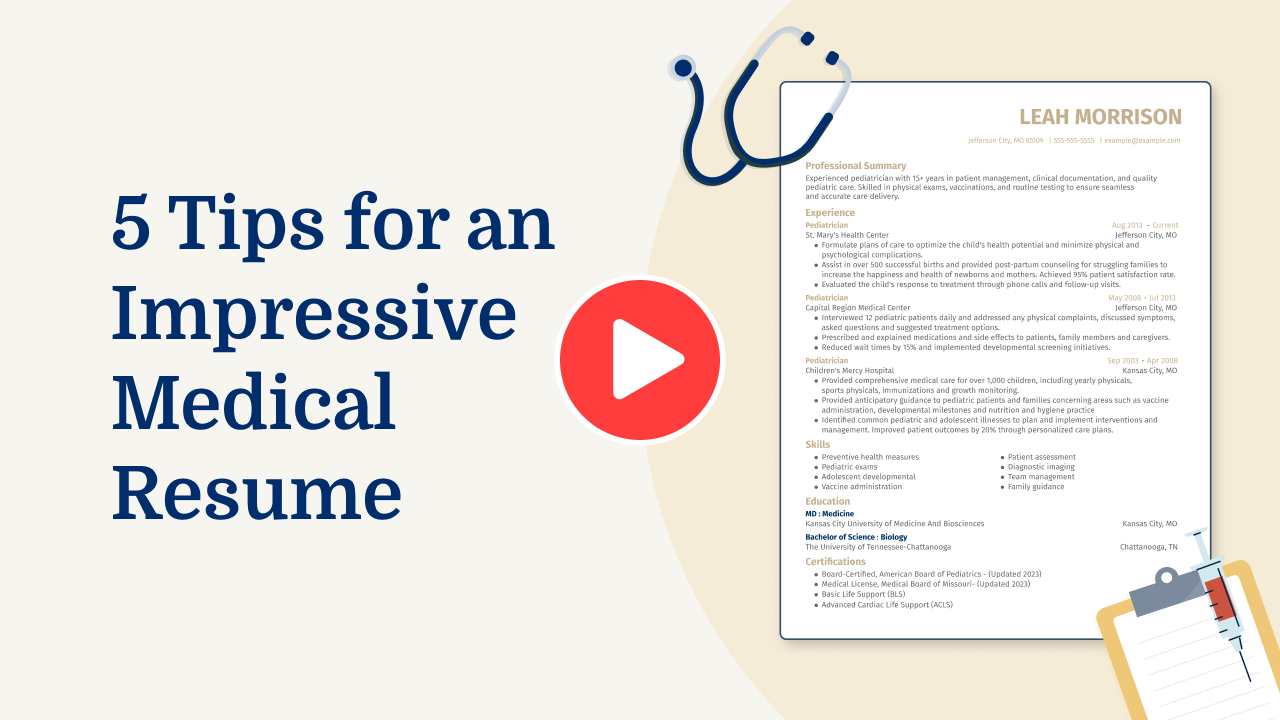
Write a strong professional summary
A professional summary on a resume serves as an introduction for hiring managers, providing a snapshot of your skills and accomplishments. You can decide whether to use a summary or a resume objective based on your experience level and career goals.
Generally, a professional summary consists of three to four sentences that highlight your achievements, skills, and experience. It works best for seasoned professionals who want to quickly showcase their value and establish their expertise.
On the other hand, resume objectives are geared toward career goals. They serve entry-level job seekers, career changers, or individuals with employment gaps by explaining “what I aim to contribute.” While summaries emphasize past accomplishments, objectives focus on future aspirations.
Explore examples of summaries and objectives tailored for various industries and levels of experience. See our library of resume examples for additional inspiration and ideas.
Medical records specialist resume summary examples
Entry-level
Recent health information management graduate with a focus on electronic health records management and data quality assurance. Certified in Health Information Technology (HIT) and experienced with ICD-10 coding during academic projects. Eager to contribute strong organizational skills and attention to detail in managing patient records accurately.
Mid-career
Experienced medical records specialist with over seven years in healthcare environments, including hospitals and private practices. Proficient in using EMR systems like Epic and Cerner to update and maintain comprehensive patient data. Recognized for streamlining record retrieval processes, reducing average retrieval time by 15%, and ensuring compliance with HIPAA regulations.
Experienced
Seasoned medical records specialist with extensive expertise in managing complex healthcare documentation workflows. Proven track record of leading teams to improve data accuracy and integrity across multiple departments. Spearheaded initiatives resulting in a 20% improvement in audit readiness scores while mentoring junior staff on best practices in records management.
Medical records specialist resume objective examples
Entry-level
Detail-oriented and organized entry-level job seeker with a background in healthcare administration seeking to leverage strong data management skills as a medical records specialist. Committed to ensuring accuracy and confidentiality in patient records while supporting efficient healthcare operations.
Recent graduate
Eager recent health information technology graduate aiming to secure a position as a medical records specialist. Equipped with knowledge of electronic health record systems and a passion for maintaining precise documentation that supports patient care delivery.
Career changer
Dedicated professional transitioning from administrative support roles into the medical field, aspiring to become a medical records specialist. Enthusiastic about applying transferable organizational skills and attention to detail to manage patient records effectively within a healthcare setting.
Highlight your skills in organizing and managing patient records. Use our AI Resume Builder to create a standout resume quickly and efficiently.
Include relevant certifications and training
Listing certifications and training is important for a medical records specialist. It shows you have the skills needed to handle sensitive health information accurately. In technical fields like this, having certifications can make you stand out to employers who want someone trustworthy and knowledgeable.
Creating a certifications section on your resume makes it easy for hiring managers to see your qualifications. Here are a few examples of certifications for your resume:
- Certified Electronic Health Records Specialist (CEHRS)
- Registered Health Information Technician (RHIT)
- Certified Coding Associate (CCA)
- Health Insurance Portability and Accountability Act (HIPAA) Training
- Medical Terminology Certification
Having these certifications helps you do well as a medical records specialist. They show you’re ready to manage patient data and keep it safe. With the right credentials, you’re more likely to succeed in this field.
Example of a certifications section
Certified Electronic Health Records Specialist (CEHRS)
Issued by: National Healthcareer Association (NHA)
Expires 2025
Registered Health Information Technician (RHIT)
Issued by: American Health Information Management Association (AHIMA)
Issued 2021
Certified Medical Reimbursement Specialist (CMRS)
Issued by: American Medical Billing Association (AMBA)
Expires 2024
Healthcare Data Analyst Certification
Issued by: American Society of Health Informatics Managers (ASHIM)
Issued 2022
Choose a polished and well-organized resume template that effectively showcases your skills and qualifications to stand out to hiring managers in your field.
Showcase your work experience
Showcasing relevant work experience on your resume is essential as a medical records specialist. It allows employers to assess your skills and contributions in previous roles. When listing your experience, ensure you use reverse chronological order.
Begin with your most recent position first, including the job title, employer name, location, and employment dates. This format allows hiring managers to easily track your career progression and understand what you offer.
Use clear, action-oriented language to describe your responsibilities and achievements. Highlight measurable outcomes when possible—such as “improved patient record accuracy by 15%.” Demonstrating real impact from your work is important.
For a medical records specialist, concentrate on core tasks like organizing patient files, updating digital records systems, ensuring data privacy compliance, and collaborating with healthcare staff to improve processes. Including specific examples of how you’ve used job-specific skills makes your resume more compelling. Discuss any systems or software you’ve used, such as electronic health records (EHR).
Mention if you’ve trained others or contributed to process improvements within a team. By clearly detailing past roles with strong actions and results, you’ll demonstrate that you’re prepared to tackle new challenges as a medical records specialist.
5 medical records specialist work history bullet points
- Managed and maintained over 2,000 patient records, ensuring compliance with HIPAA regulations, resulting in a 15% increase in data accuracy.
- Implemented an electronic health record (EHR) system, reducing paper record usage by 40% and improving retrieval time by 25%.
- Trained and supervised a team of 4 junior staff members on proper documentation procedures, improving overall department efficiency by 18%.
- Audited patient files and corrected discrepancies, leading to a 20% reduction in billing errors.
- Coordinated with healthcare providers to streamline the transfer of medical records, improving inter-departmental communication by 30%.
Select a resume format that emphasizes your organizational skills and experience with medical records systems.
Match your resume with the job description
Tailoring resumes to job descriptions is essential for catching the attention of employers and getting through applicant tracking systems (ATS). Many companies use ATS software to scan resumes for specific keywords that match the job posting.
An ATS-friendly resume integrates keywords from the job description that align with your skills. Incorporating these targeted words and phrases increases your chances of being noticed by hiring managers who depend on this technology to filter applications effectively.
To identify keywords for a medical records specialist resume, carefully review job postings and pay attention to the skills, qualifications, and responsibilities that are repeated. Common examples may include medical coding, patient records management, HIPAA compliance, electronic health records (EHR) systems, and data entry accuracy.
Incorporate these terms naturally into your resume content. For example, instead of writing “Maintain patient records,” you could say “Managed and updated electronic health records (EHR) in compliance with HIPAA regulations, ensuring accuracy and accessibility for clinical staff.” This approach mirrors the language employers use while clearly showcasing your expertise as a medical records specialist.
Don’t let simple mistakes cost you a job! Use our ATS Resume Checker to catch formatting errors, missing keywords, and layout problems before you apply.
Salary Insights for Medical Records Specialists
Exploring salary data can help you make informed decisions about your career path and negotiation strategy. Find key insights below to guide your research.
Top 10 highest-paying states for medical records specialists
Medical Records Specialists earn varying salaries across the United States, with a national average of $54,433. The table below highlights the states where medical records specialists command the highest compensation.
Our salary information comes from the U.S. Bureau of Labor Statistics’ Occupational Employment and Wage Statistics survey. This official government data provides the most comprehensive and reliable salary information for medical records specialists across all 50 states and the District of Columbia. The figures presented here reflect the May 2025 dataset, which is the most recent available as of this publication.
| State | Average Salary |
|---|---|
| District of Columbia | $76,990 |
| Washington | $68,020 |
| California | $68,080 |
| New York | $64,550 |
| Maryland | $64,380 |
| Hawaii | $64,690 |
| Nevada | $63,950 |
| Connecticut | $61,230 |
| Massachusetts | $60,460 |
| Minnesota | $60,240 |
FAQ
Do I need to include a cover letter with my medical records specialist resume?
Yes, including a cover letter with your medical records specialist resume can improve your application and increase interview opportunities.
A cover letter allows you to highlight your specific interest in the healthcare facility while detailing experiences that make you an ideal job seeker for managing patient data efficiently.
For instance, if the organization uses a particular electronic health record system, mention any certifications or relevant experience you have working with it.
To create a personalized cover letter that aligns seamlessly with your resume, consider using our Cover Letter Generator.
Additionally, exploring cover letter examples can offer valuable insights into expressing enthusiasm and showcasing skills effectively for this role.
How long should a medical records specialist’s resume be?
For a medical records specialist, a concise one-page resume is typically effective to highlight key skills like data management, attention to detail, and skill with electronic health record systems. Focusing on core competencies ensures that recruiters quickly see your qualifications.
However, if you have extensive experience or specific certifications relevant to medical records management, a two-page resume might be more appropriate. This format allows you to thoroughly showcase your expertise and accomplishments without overwhelming the reader.
Consider exploring our guide on how long a resume should be for further insights and examples tailored to different career stages.
How do you write a medical records specialist resume with no experience?
If you’re drafting a resume with no experience for a medical records specialist position, highlight relevant skills, education, and related training that show your potential in the role. Here are some tips to get you started:
- Emphasize educational background: Highlight any courses or certifications related to health information management, data entry, or medical terminology. If you’ve completed a degree in healthcare administration or a similar field, list it prominently.
- Include volunteer or intern work: Experience doesn’t have to be paid. Mention any internships or volunteer roles where you handled administrative tasks, organized files, or used medical software.
- Showcase transferable skills: Focus on skills like attention to detail, organizational ability, and skill in computer applications, which are important for managing medical records effectively.
Check out resources on creating a resume with no experience for more detailed guidance and examples tailored to beginners entering the healthcare sector.
Rate this article
Medical Records Specialist
Share this page
Additional Resources

Medical Residency CV Examples & Templates
Internal Medicine
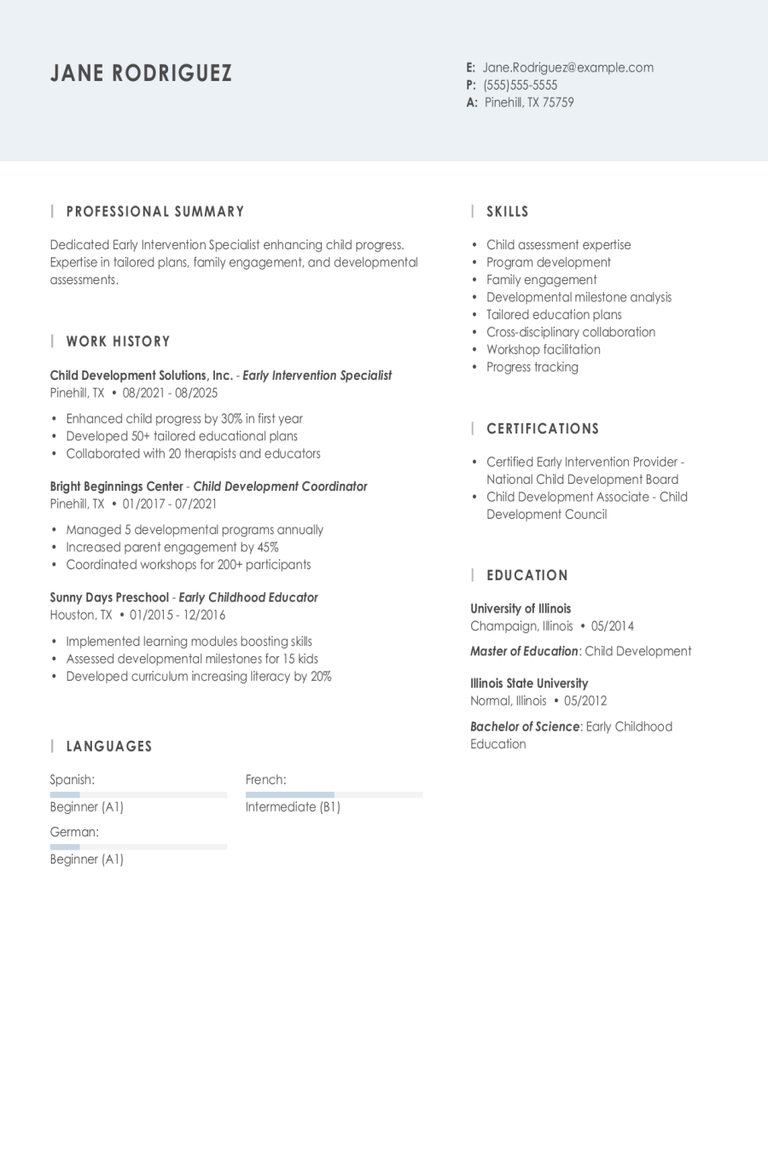
Early Intervention Specialist Resume Examples & Templates
Discover early intervention specialist resume examples and tips that will help you highlight your skills in child development, communication, and teamwork to make your experience stand out.Build my resumeImport existing
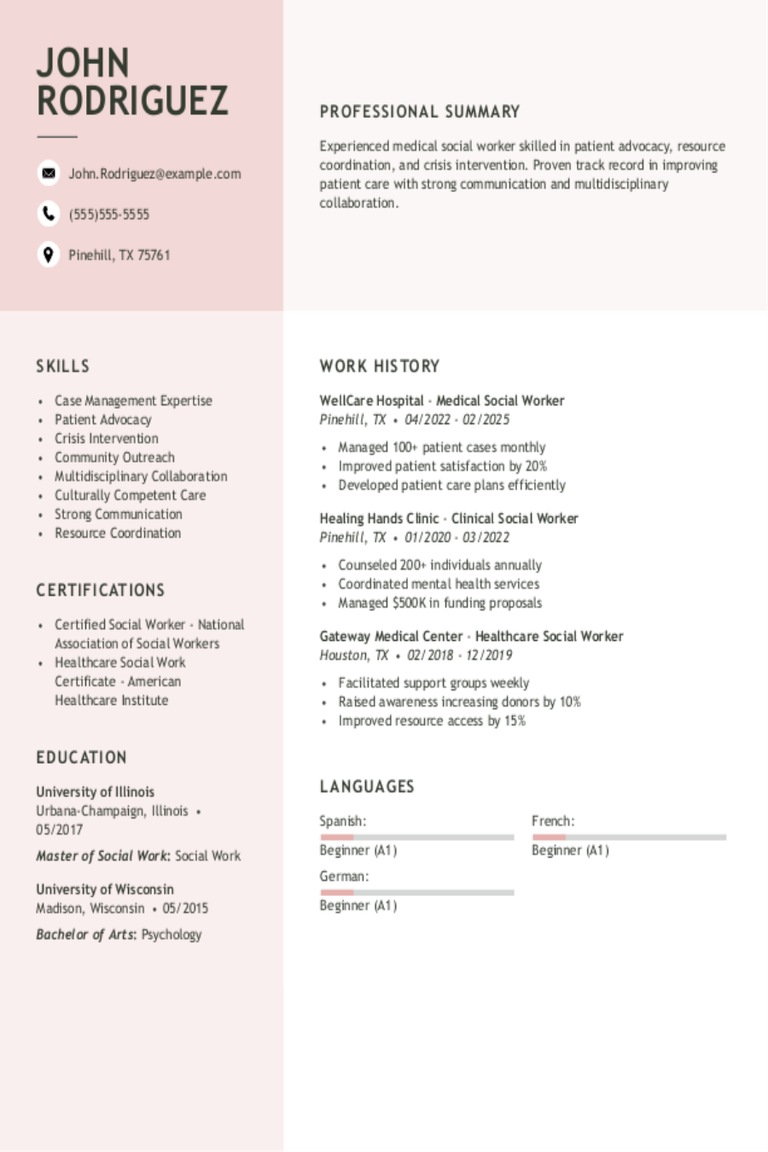
Medical Social Worker Resume Examples & Templates
Explore medical social worker resume examples and discover how to effectively showcase your experience in helping patients navigate complex medical systems and emotional challenges.Build my resumeImport existing resumeCustomize this templateWhy
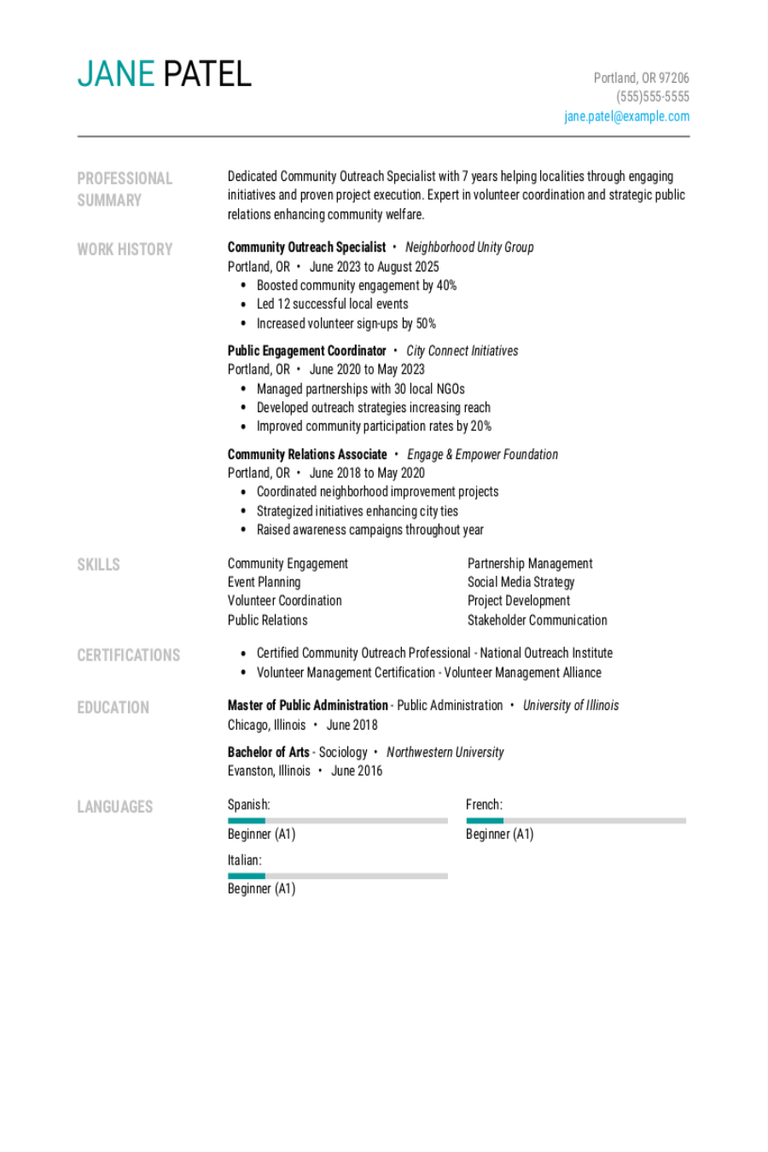
Community Outreach Specialist Resume Examples & Templates
Browse community outreach specialist resume examples and learn how to show you connect with people, plan events, and support your community.Build my resumeImport existing resumeCustomize this templateWhy this resume worksQuantifies
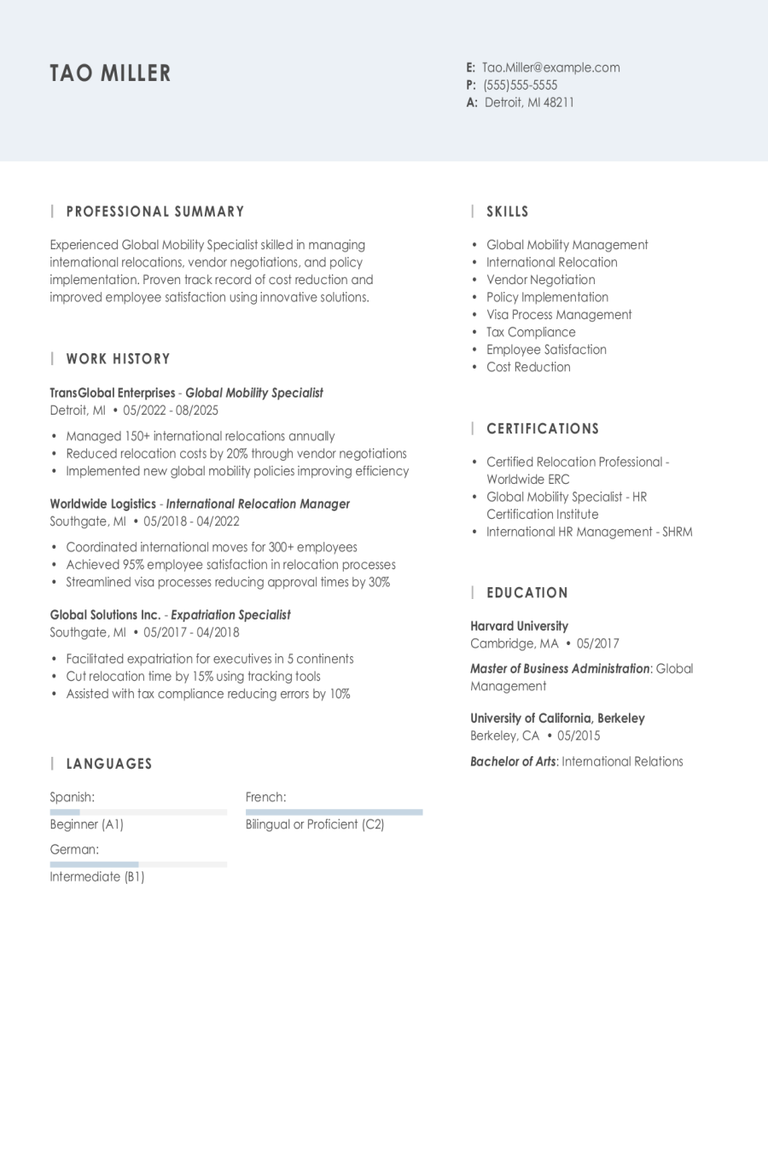
Global Mobility Specialist Resume Examples & Templates
Explore global mobility specialist resume examples to see how to showcase your skills in coordinating international assignments and managing employee relocations. Browse tips to help you highlight your expertise in
